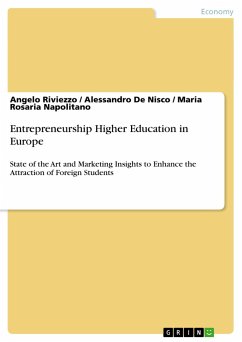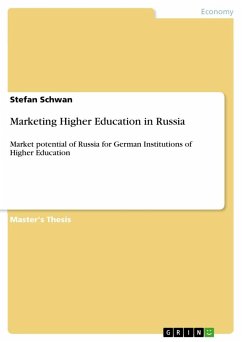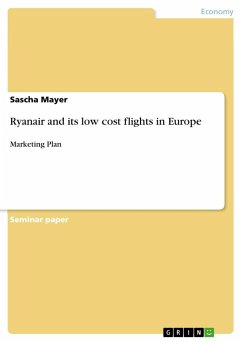Document from the year 2012 in the subject Business economics - Offline Marketing and Online Marketing, University of Sannio, course: Entreprenership/Marketing, language: English, abstract: Europe aspires to increase its share of the international students market, in which the number of internationally mobile students is predicted to rise to 7.2 million by 2025. Entrepreneurship, as a relative "recent" and potentially high attractive field of study, could represent a strategic subject to enhance the attractiveness of European higher education, especially towards those students coming from countries where entrepreneurship education is less developed.Starting from the above considerations, this book aims: a) to present an extensive picture of entrepreneurship higher education in Europe; b) to analyze perceptions and intentions of potential target groups (i.e. foreign students); c) to design a suitable marketing strategy to improve the European entrepreneurship higher education offer and its share in the international students market, as a result of the previous analyses. To this aims, two different surveys have been managed.On one side, primary data have been collected on the presence of entrepreneurship education activities - from the undergraduate to the post-graduate courses - within the universities of all the 27 European Union member States. On the other side, the real interest in pursuing some educational activities in Europe, especially related to entrepreneurship, has been assessed among students from extra-European universities. In particular, the same questionnaire has been submitted to a sample of students at higher education level in India, Singapore, China, Russia, Argentina, Brazil and Turkey.Finally, as a result of the two surveys, a strategic marketing framework has been developed through the definition of products and segments (i.e. "product portfolio" of the European education offer and "emerging segments" in third countries) and the identification of market opportunities in order to define attractive educational products.The results discussed in this book are a significant part of the research activity carried out within the three-years project "ENDEAVOUR: Entrepreneurial Development as a Vehicle to Promote European Higher Education", co-financed by the Erasmus Mundus Programme in 2006.
Bitte wählen Sie Ihr Anliegen aus.
Rechnungen
Retourenschein anfordern
Bestellstatus
Storno








